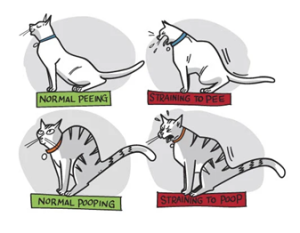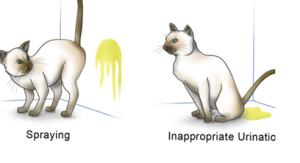
Many cat owners encounter the challenging and often distressing problem of their feline friends urinating outside the litter box. This behavior can be perplexing and emotionally taxing, but with a better understanding of the potential causes and effective strategies, you can work towards resolving the issue and ensuring a happy, healthy environment for your cat.

Common Reasons for Inappropriate Urination
- Medical Issues
One of the first steps if your cat starts urinating outside the litter box is to rule out health problems. Conditions such as urinary tract infections (UTIs), bladder stones, kidney issues, or diabetes can cause discomfort and urgency, prompting cats to urinate elsewhere. Symptoms to watch for include blood in the urine, frequent trips to the litter box, straining, or signs of pain. A veterinary check-up is critical to diagnose and treat any underlying medical conditions.
- Litter Box Problems

Cats are generally clean animals and can be very particular about their bathroom habits. Factors influencing their use of the litter box include:
- Cleanliness: Cats prefer a clean litter box; a dirty box can discourage usage.
- Size and Depth: The box should be large enough for the cat to turn around comfortably; too small or shallow may be uncomfortable.
- Type of Litter: Some cats dislike certain textures or scents. Unscented, clumping litter is usually preferred.
- Location: A noisy or high-traffic area can intimidate cats, while a quiet, private spot encourages use.
- Number of Boxes: The rule of thumb is one more box than the number of cats in the household.
3. Stress and Anxiety

Cats are sensitive creatures, and changes in their environment can cause significant stress. This can include:
- Moving to a new home
- Introduction of new pets or family members
- Visitors or loud noises
- Changes in routine or furniture arrangement
Stress might lead your cat to mark their territory with urine outside the box as a way of coping.

4. Territorial Marking and Behavioral Factors
Unneutered male cats are notorious for urinating to mark territory, especially if they sense other cats nearby. Female cats may also mark territory, particularly if they feel threatened. Additionally, some cats may develop behavioral issues due to past trauma or lack of mental stimulation, leading to inappropriate urination.
How to Address and Prevent Inappropriate Urination

Medical Consultation
Always start with a veterinarian visit to rule outMedical causes. Early diagnosis and treatment can resolve health issues that contribute to the behavior.
Maintaining a Clean and Comfortable Environment

- Litter Box Hygiene: Scoop the litter box daily and do a full cleaning with soap and water weekly.
- Choosing the Right Litter: Experiment with different types until you find one your cat prefers.
- Proper Placement: Keep litter boxes in quiet, private locations away from noisy appliances or high-traffic areas but accessible to your cat.
Providing Adequate Resources
- Increase Number of Litter Boxes: Place them in different quiet locations to prevent territorial disputes.
- Size and Accessibility: Ensure each box is large enough and easy for your cat to access comfortably.
Reducing Stress and Environmental Enrichment

- Create Quiet Spaces: Provide cozy hiding spots and vertical spaces like cat trees or shelves.
- Routine and Stability: Keep feeding times, play, and interactions consistent.
- Environmental Enrichment: Interactive toys, scratching posts, and regular playtime can reduce anxiety and boredom.
Altering Behavioral Tendencies
- Spaying and Neutering: This is often the most effective way to reduce territorial marking and aggressive behaviors.
- Feliway Diffusers or Sprays: These products release soothing pheromones that can reduce stress.
- Deterrents and Cleaning: Use enzymatic cleaners to thoroughly remove scent markings, and consider deterrent sprays in problematic areas.
Additional Tips for Success
- Observe and Model Behavior: Keep an eye on your cat’s habits and preferences to identify triggers.
- Reward Good Behavior: Use treats and praise to encourage proper litter box use.
- Consult a Behaviorist: If problems persist, seek guidance from an animal behaviorist or professional trainer.
When to Seek Professional Help

Persistent inappropriate urination despite your efforts warrants professional intervention. A veterinarian or animal behaviorist can help identify subtle medical or behavioral issues and develop a tailored plan for treatment.
Conclusion
Inappropriate urination is a common issue in cats, but it’s often manageable with patience, understanding, and proper care. Remember that your cat’s behavior is usually a form of communication; whether signaling discomfort, stress, or territorial instincts. Addressing the root cause with a combination of medical care, environmental adjustments, and positive reinforcement can help restore





Leave a Reply